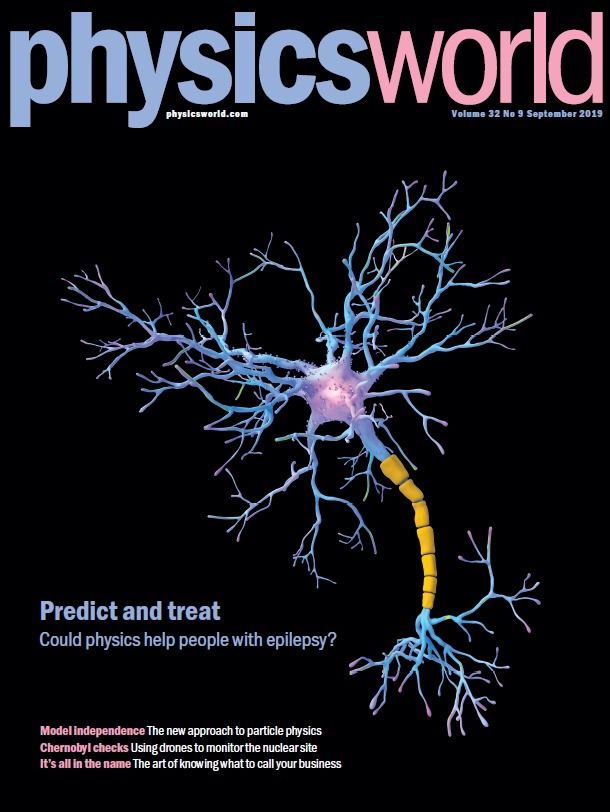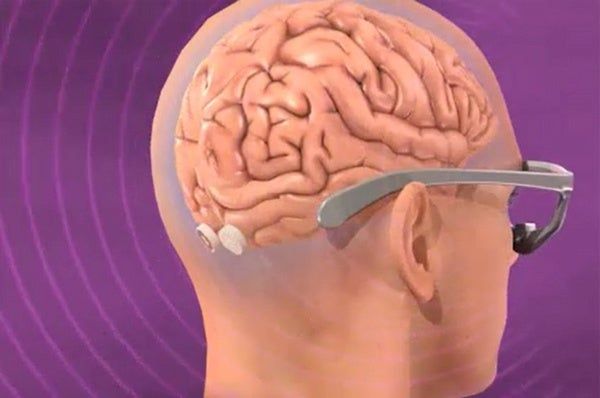Category: health – Page 408

The physics of epilepsy, drones to monitor Chernobyl, and the ‘model-independent’ approach to particle physics
Could physics help people with epilepsy? That’s the question tackled by Louis Nemzer, a physicist at Nova Southeastern University, in the September 2019 issue of Physics World magazine, which is out now in print and digital formats.
He thinks that machine learning and real-time monitoring of the brain could give people with epilepsy live information about how much at risk they are of an imminent seizure – and is even developing a smartphone app to help them in daily life.
Elsewhere in the issue, Peter Martin and Tom Scott from the University of Bristol describe how they’ve used drones to map radiation levels at the Chernobyl plant, which you can also read on this website from 2 September, while Kate Brown from the Massachusetts Institute of Technology examines the health impact of Chernobyl fall-out.

English man becomes first international patient in Spanish Listeria outbreak
The first international case of listeriosis linked to an outbreak in Spain that has sickened almost 200 people and killed two is being investigated by British public health officials.
The outbreak has been traced to contaminated chilled pork products under the brand “La Mechá” made by Magrudis, based in Seville. The potential infection is in a man from England who ate the product in Seville in mid-August. He was treated at a hospital in France before returning to the United Kingdom.
A Public Health England spokeswoman told Food Safety News the agency does not disclose patient details so she was not able to provide information on the age of the man or where in England he lives.

Police urge residents in Texas town to vacate homes during nearby SpaceX rocket launch
Police in a small Texas community have recommended that residents temporarily vacate their homes on Monday while Elon Musk  Elon Reeve MuskUS Space Command: A vision for the final frontier The paradox of superstars Hillicon Valley: US, France reach deal on tech tax | FEC vice chair resigns | Move leaves agency unable to vote on actions | Groups seek net neutrality pledge from 2020 Dems | Australia eyes blocking extremist content MORE ’s SpaceX attempts an experimental launch of a Mars rocket prototype.
Elon Reeve MuskUS Space Command: A vision for the final frontier The paradox of superstars Hillicon Valley: US, France reach deal on tech tax | FEC vice chair resigns | Move leaves agency unable to vote on actions | Groups seek net neutrality pledge from 2020 Dems | Australia eyes blocking extremist content MORE ’s SpaceX attempts an experimental launch of a Mars rocket prototype.
A public safety notice was issued to residents of Boca Chica, a town on the southern tip of Texas with houses within two miles of SpaceX’s launch pad for the Starhopper rocket, Business Insider reported on Sunday.
A county sheriff reportedly went door-to-door on Saturday to deliver the notice to approximately 20 households, warning of possible shattered windows and “potential risk to health and safety.”

The Elon Musk of China: Dr. Wang Jian of BGI
There are many famous innovators in the Western world who have a bold vision, go after massively transformative projects and despite investor and public criticism deliver on their promises. Jeff Bezos, Larry Page, Sergey Brin, Mark Zuckerberg, and Steve Jobs are household names who went against the current, pushed their vision through and succeeded touching everyone on the planet and making the world a better place.
Since the passing of Steve Jobs, the crown of the bold inventor, innovator and high-tech businessman passed to Elon Musk who despite frequent criticism is the undisputed leader of disruptive entrepreneurship. However, when I ask some of the most informed westerners in my network to recall one global entrepreneur with an Asian name disrupting their life in the same positive way and at the same scale as Elon, very few can recall anyone besides Jack Ma, Dr. Lee Kai-Fu, or Dr. Ge Li. Even fewer would be able to name the exact contribution these people made to their health and wellbeing. For example, few people know that Dr. Ge Li’s companies that act as global open research platforms assisted in the discovery of many of the cutting-edge life-saving treatments that are benefiting everyone on the planet. There will be books written about the transformative role of these people in the future and, hopefully, Netflix documentaries.
But there are many great innovators and entrepreneurs, who are working on bold new ideas and technologies that will change everyones’ life in a very impactful and positive way but are not known to the general public in the West. These innovators often face criticism from the investor community which wants to see business models and projects that they can understand, projects they can believe and get the immediate returns. Like Elon Musk they face a lot of resistance but over time prevail and will impress every one of us. They will go down in history as pioneers and their names will be known in every household.

A New Type of Visual Prosthetic
In normal vision, light falls on the retinas inside the eyes, and is immediately transduced into electrochemical signals before being uploaded to the brain through the optic nerves. So you do not see light itself, but the brain’s interpretation of electrochemical signals in the visual parts of the brain. It follows that, if your eyes do not work, but your brain is stimulated just so, your visual neurons will activate (and you will be able to see) just the same as if your eyes were in perfect condition.
Sounds easy, but can we do that? Building on decades of research in visual neuroscience, my lab, in collaboration with Susana Martinez-Conde’s, has now conducted some of the studies that validate this idea, completing some of the most important preliminary steps towards a new kind of visual prosthetic.
Francis Collins, the Director of the National Institutes of Health, has just posted a blog that highlights our approach. He took notice of our work when we first presented it at this year’s meeting for the Principal Investigators of the BRAIN Initiative—the NIH led government funding initiative meant to spur research along on topics like brain implants. The BRAIN Initiative funds several agencies including the NIH, including the National Science Foundation, who kindly funded the grant driving our research thus far.